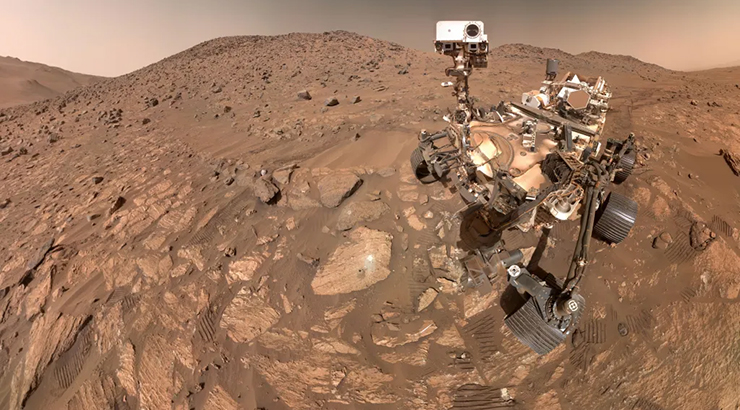Kutztown University to Pair with Mars 2020 Rover for 5-Year NASA Grant

NASA’s Perseverance Mars rover took this selfie, made up of 62 individual images. A rock nicknamed “Cheyava Falls,” which has features that may bear on the question of whether the Red Planet was long ago home to microscopic life, is to the left of the rover near the center of the image.
KUTZTOWN, Pa. – Kutztown University’s Department of Physical Sciences has been awarded a five-year, $375,000 grant from NASA for its Here to Observe (H2O) program. The H2O Program gives undergraduate students the opportunity to observe and interact with NASA Planetary Science Division teams, with the goal of inspiring historically marginalized groups to be part of the STEM workforce.
This program gives undergraduate student observers the opportunity to join a scientific community and interact with the Mars Perseverance Rover team at the Jet Propulsion Laboratory (JPL) in Pasadena, Calif. The objective of KU’s Here to Observe+Here to Storytell (H20+H2S) is to support student retention in STEM through developing workforce experiences by engaging with mission science and scientists through the Here to Observe core activities and mentoring; and empowering student voices through creating a scientific storytelling product.
KU’s H20+H2S program will use mission science and scientific storytelling as a student experiential learning tool to scaffold workforce skills. Each year, the 10-12 Student Observer cohort will be composed of STEM and STEM-interested freshmen, sophomores and incoming transfer students from introductory courses. KU has an established ‘learning community’ approach, where a group of students are paired with faculty mentors and meet once a week as a part of their schedule. Students will also have peer mentoring by two upperclass students.
During the meeting times, students will be learning about Mars science, mission design, be trained in scientific ethics and develop their storytelling products. In addition, the group will join Mars 2020 operations and science meetings to see the mission in action. Paired with mentors from the Mars 2020 mission team members, students will learn about STEM careers. The group will also attend the international Lunar and Planetary Science Conference in Houston, Texas in March. During this week-long conference, students will collaborate with their mentors, attend science talks and visit the Johnson Space Center. The grant provides all funding and support for these activities.
The project is led by two STEM faculty with expertise to support learning communities, science narrative, planetary science, technology and student-centered learning. Dr. Erin Kraal, professor of Physical Sciences, will serve as the principal investigator for the project, alongside co-investigator Donna DeMarco, faculty in Computer Science and Information Technology.
Kraal’s scientific training is in planetary surface processes, where she merges field, remote sensing, experimental and numerical modeling to understand surface evolution. Kraal is also a National Science Foundation (NSF)-funded researcher in scientific education, examining the role of narrative in reaching diverse populations in general education courses. She also serves senior personnel on the KU NSF NOYCE Grant (Mentoring Urban STEM Teachers for Equity and Innovation). She currently serves as the faculty director for the Center for Engaged Learning, supporting faculty pedagogical development. Kraal will oversee the collaboration between the mission team, coordinate the field/meeting trips, co-teach the seminar and lead the programmatic assessment.
DeMarco teaches undergraduate and graduate courses in software development, ethics, information technology and project management. She brings 30+ years of industry expertise in software engineering, project management and team building to guide and mentor the students with project-based learning and student-driven learning courses. As co-founder of an online video platform, she has 15+ years of video storytelling experience. DeMarco is an advisor on NSF-funded project entitled "Cogenerative Development of Culturally Relevant Pedagogical Guidelines for Computer Science and Computational Thinking in High Schools." She will supervise the upperclass mentors, coordinate the mission science narrative project and co-teach the seminar course.
The H2O+H2S program focuses on creating products that articulate workforce skills on student resumes. This directly supports enhanced student success when applying for future internships, graduate school and industry jobs.
Learn more about the H20 program online.






